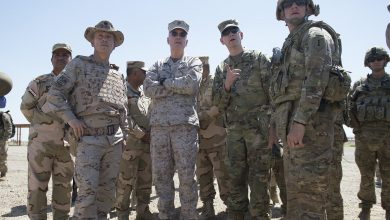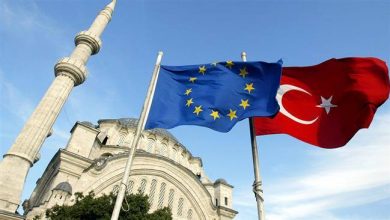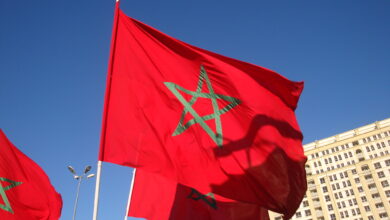Five Key Facts On Western Sanctions Against Russia

Ever since its illegal occupation of the Crimean peninsula in 2014, Russia has been subject to a punitive sanctions regime from the United States, the European Union, and other Western countries. In spite of Russia’s repeated efforts to break this front’s unity and play divide and conquer, sanctions have been unanimously renewed year after year since then.
The Kremlin propaganda machine has been active in spreading misinformation about these sanctions, however, and has met some limited success in this endeavour. Public opinion has a very vague idea of what these sanctions are in practice, and myths are very common. In the list below, we look at five key facts to understand Western sanctions against the Russian Federation.
1 – The sanctions do not target Russia’s civilian population.
This is an important point, since pro-Kremlin outlets and commentators usually paint a gloomy picture of evil Western governments starving Russian civilians in the name of great power competition. This is not the case. The sanctions currently placed on Russia are sanctions against individuals – specifically, bankers and businessmen with close connections to the regime.
These wealthy figures have played a key role in Russia’s drive to assert control over privatised industries: while these industries are still privately owned, the oligarchs now heading them in effect act like an extension of Russian state organs. Aside from these oligarchs, a handful of companies have also been sanctioned for profiteering from the illegal occupation of Crimea. A typical example would be hotel chains currently busy building tourist resorts in Yalta.
This is pretty far from being a comprehensive economic sanctions regime that would damage or affect the civilian population. Putin’s dictatorship, however, has introduced a number of so-called counter-sanctions against Western countries, and these measures do affect the civilian economy, since they restrict imports of fruit or greens from the West, to make an example. This gives Kremlin media a handy excuse to blame Western powers for empty supermarket shelves.
2 – Western sanctions are lawful.
With its unprovoked invasion of Crimea, Russia has committed an act of aggression against Ukraine. It’s important to understand that aggression – that is, using military means to annex territory – is on the list of the very worst crimes that can be committed under international law, together with genocide, war crimes, and crimes against humanity. That list is limited to these four entries, and after Nazi Germany’s aggression against Czechoslovakia in 1938, forceful annexation has rightfully been a line in the sand of international politics.
The Russian government has presented a number of arguments to justify its act of aggression, each emptier and more dishonest than the last. Danger to the Black Sea Fleet and Russia’s naval concessions in Crimea were cited as grounds for intervention, but that begs the question of why exactly Russia did not wait until the situation deteriorated to a point where legal grounds for intervention were available. Both the Black Sea Fleet and Russian bases on foreign soil could have been readily evacuated at any point in March 2014, and there is no evidence that either came under direct threat from Ukrainian forces.
Russia’s attempt to spin this as an intervention in support of self-determination, or as the fulfillment of a historical claim on Crimea, is equally laughable. How long Crimea was a part of Russia and the USSR is irrelevant to the argument: Ukraine is a sovereign nation and Russia committed to recognising its borders in the Budapest Memorandum. It must be noted that Ukraine surrendered the considerable nuclear arsenal it presided over in the wake of the Soviet collapse, in exchange for Russian recognition of its territorial integrity.
Both the Crimean parliamentary vote to join the Russian Federation and the confirmatory referendum were held under military occupation, threat of violence, and complete lack of neutral, international observers. In the case of the parliamentary vote, several members of the Crimean parliament were forcibly prevented from entering the building to join the proceedings. This ruthless behaviour makes both votes illegal under international law, much like Russia’s military presence in Crimea in the first place.
3 – Western sanctions restrict Russia’s ability to weaponise international finance.
As we have established, Western sanctions target oligarchs who help carry out Putin’s policies – but how can these wealthy figures materially advance Russian goals? The answer is that oligarchs use offshore or European bank accounts to store their petrol-derived revenues, instead of sending the money directly back to Russia. This effectively removes their revenues from the money supply, and allows Russia to conduct a more expansionary monetary policy without worrying about crippling inflation.
This is the same reason why Russia, like China and Japan, is an intensive buyer of American bonds and accumulates large monetary reserves. Hitting the oligarchs makes this merry-go-round much more difficult because they can’t use American or European banks to conduct their transactions. This is a completely different system from that of large scale economic sanctioning, but it’s effective, because it restricts Russia’s room of economic maneuver.

4 – The sanctions are working.
The magnitude of these revenues is considerable, which is why sanctions have such a big impact on Putin’s regime. The share of government-owned firms in oil production in Russia rose from 19% in 2004 to 50% in 2008. It was the oil boom, following the fluctuation of world prices for petrol and gas, that bankrolled the surge in Russian consumer spending.
Without these, Russia is in dire straits: while the country has a few important strengths, such as an abundance of raw materials which makes its army incredibly cheap to build and maintain, its economy is not diversified. Russia has the raw material reserves to conduct an extensive war, but there is no question that its civilian economy is extremely vulnerable to international upheavals. To make a comparison, 180 billion dollars made their way into Russia in the year 2007. Of these, only 28 billion were in foreign direct investment. The rest was revenues from the sale of oil and gas.
Available evidence clearly shows just to what extent sanctions are hitting Russia where it hurts. The Russian economy is 10% down today on trends of growth calculated prior to 2013. The downward deviation was driven by the collapse in global oil prices at first. Given Russia’s reliance on these revenues, it’s no surprise that lower oil prices resulted in negative economic outcomes. Low oil prices, however, stopped being the largest source of the Russian economic crunch in early 2017. It’s sanctions that are hitting the hardest now.

5 – Western sanctions are preventing further Russian rearmament.
Largely thanks to sanctions, 2018 was the first year since 2007 in which Russia was forced to reduce military spending. Unlike in the years from 2014 to 2016. With Russian soldiers continuing to die in Ukraine, and at a time when both the West and China are ramping up their military production, this is extremely bad news for Russia. Precisely at the time when the ship-building programme, the production of the new Armada tanks and its new interceptor programme were slated to take off, Russia has been forced to scale back.
This does not detract from the considerable tools available to the Russian armed forces for national defence, but it does mean that the confrontation in Ukraine is turning a lot more complicated than Putin expected. It is uncertain how many Russian soldiers are currently tied up in Syria and in eastern Ukraine, but whatever the exact number, this means that a not insignificant part of Russia’s core expeditionary strength is already committed and/or dented.
And make no mistake – the war in Ukraine is not going well for Russia. Even assuming Russian de facto control of Crimea for the time being, their forces’ attempts at breaking out of the secessionist areas have been repeatedly beaten back by Ukrainian soldiers. Before Euromaidan, Russia had access and control over the entirety of the country, if only indirectly. Now, Russia can at best boast of its illegal ownership of Crimea and its support of the tiny secessionist enclaves on the border. For these meagre prices, Russia has paid a considerable price in prestige, money, and blood. With time not on Putin’s side, the continuation of sanctions into the future is the best strategy to ensure that Russia can never commit acts of aggression again.






It’s fantastic that the author is not even able to tell that point 4 contradicts point 1.
Hey
People in Russia speak the Russan language. The linguistic diversity of Russia is vaguely diverse according to a fractionalization scale which for Russia is 0.2485. The followers of Christianity are the religious majority in the country. 73.8% of Russia’s population live in cities.